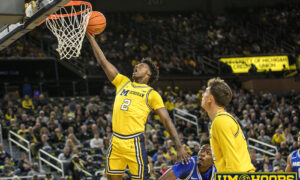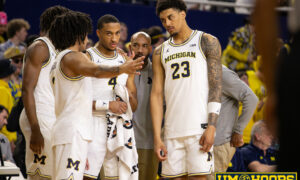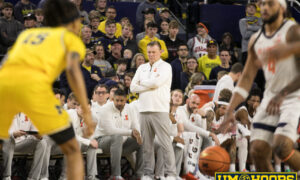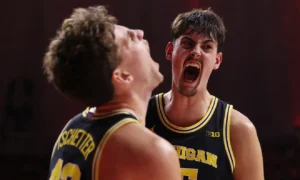Michigan tips off the 2011-12 season on Friday afternoon ranked as the No. 18 team in the country. Preseason rankings are an inexact metric based on reputation more than fact but the Wolverines are respected nationally after a strong finish to the 2010-11 season. Computers aren’t gun shy about Michigan either, Ken Pomeroy’s preseason projections have U-M at No. 22 nationally. In order to take a closer look at the upcoming season, here’s a look at five reasons why Michigan should excel and could be poised to be John Beilein’s best performing team in Ann Arbor.
1. Returning Experience
Michigan only has two seniors but the Wolverines return a significant portion of last year’s team with game experience. Zack Novak is about as good as it gets in terms of pure leadership ability and that will make a difference. The three year captain’s hustle and emotion have won over his fans and teammates and he led Michigan in minutes last season.Stu Douglass has played major minutes, starting 58 games, throughout his career and has seen the highs and lows of a Big Ten season. Jordan Morgan, Evan Smotrycz and Tim Hardaway Jr. all played major minutes in their first season of action. Last year’s experience should give each sophomore enough experience to be worthwhile but prove just how much there is to build on. Matt Vogrich is a junior and has made strides physically, finally looking more like he’s ready to compete at this level, and will provide a veteran shooter off the bench.
Experience doesn’t win you games – Michigan was one of the least experienced teams in the country last year – but there’s little doubt that Michigan has a cohesive and veteran group to build around.
2. Tim Hardaway Jr.
It was just an exhibition game, and he didn’t shoot the ball well, but Tim Hardaway Jr. looked bigger, stronger and more confident than a season ago. He looked every bit of the star that Michigan needs him to be. That was a welcome sign because when Hardaway shot the ball poorly last year he struggled, floating around on the perimeter and failing to impact the game in other ways.
He’s unlikely to shoot the ball as well as he did for the final two months of the 2011 season but the rest of his game should continue to improve. He’ll have even more opportunities without Darius Morris at his side and has already shown signs of being a significantly improved rebounder. A cause for concern could be in the turnover department as he tries to distribute the ball more often, a little slippage there could be acceptable though as Hardaway was one of the top 50 players in the country at valuing the basketball.
Hardaway has the skills and the opportunity and looks ready to carry the Wolverines.
3. Strong Defense Down the Stretch
Michigan played very impressive basketball during the final stretch of last season. The Wolverines outscored opponents by .03 points per trip during the final nine games of the regular season and their defensive play was a catalyst for their improvement. The Wolverine defense improved from 1.17 points allowed per trip in the first half of conference play to 1.01 points allowed per trip in the second half. That dramatic turnaround came with the same players and most of the same schemes but was a clear sign of John Beilein’s team growing up. If Michigan can continue to defend at that level in 2011-12, it will win a lot of basketball games.
Michigan might not have great defenders individually. The Wolverines best perimeter defender is Stu Douglass, Zack Novak is ill-equipped to defend either of his common positions (the two or four) and Jordan Morgan isn’t a great shot blocker. More than any other part of basketball, defense is unquestionably a team effort, more dependent on the sum of the parts rather than individual greatness. The Wolverines will need to find that cohesion defensively that carried them down the stretch last season.
The keys to Michigan defense: defensive rebounding, not fouling and forcing difficult shots. You aren’t likely going to see a lot of blocks, steals or pressure – despite John Beilein going to the occasional 1-3-1 defense. Instead pay close attention to the defensive rebounding statistic. Tim Hardaway Jr. and Evan Smotrycz’s improved frames could lead to improved rebounding as well as Jon Horford, Michigan’s top per possession rebounder last season, playing a more important role.
4. Big Ten Departures
There aren’t a lot of teams in this league that are expected to be dominant. Ohio State is the only team that appears to be a sure thing. Wisconsin is close, with an All-American in Jordan Taylor, but no one else truly stands out. The list of players that graduated or moved on is impressive, highlighted by JaJuan Johnson, Kalin Lucas, Talor Battle, E’Twaun Moore, Demetri McCamey and Jon Leuer. There are a lot of teams in the league that will be relying on freshmen players, fifth year transfers or otherwise unproven players. Michigan loses Darius Morris but still returns more production that most of the upper half of last year’s conference.
Every question mark about the 2011-12 Wolverines is matched by question marks in other locker rooms. Five other Big Ten schools lose their starting point guard from a season ago. Teams like Wisconsin, thought to be the league’s second best, will be relying on unproven big men to play critical roles. There are very few sure things in this year’s conference.
5. Turnovers
John Beilein teams don’t turn the ball over. Good Beilein teams don’t turn the ball over and bad Beilein teams don’t turn the ball over. Those extra possessions are generally enough to keep the Wolverines in games, even if outmatched in talent from time to time. A freshman point guard could be a concern in the turnover department but Zack Novak, Stu Douglass and Tim Hardaway Jr. have all done a great job of limiting turnovers throughout their careers. Expect the 2011-12 Wolverines to rank in the top-25 nationally in turnover rate yet again, just as six of John Beilein’s last seven teams have done as well.

![ZACK-NOVAK-thumb-590x406-72113[1] ZACK-NOVAK-thumb-590x406-72113[1]](http://www.umhoops.com/wp-content/uploads/2011/11/ZACK-NOVAK-thumb-590x406-721131_thumb.jpg)







